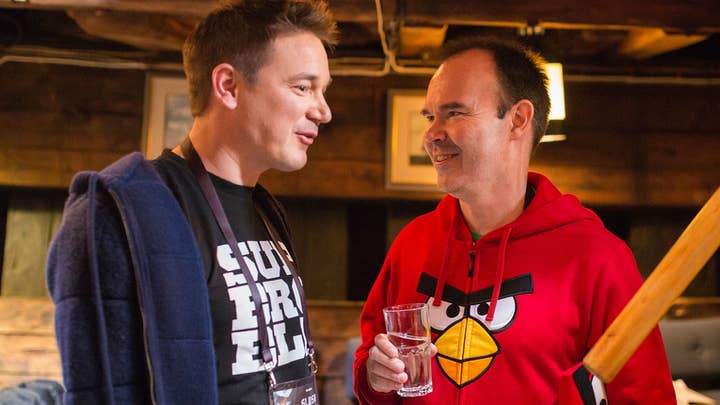What we can learn from... Nordic developers
Consultant Will Luton explores the factors that have allowed a small part of the world to cast a large shadow over the industry
What We Can Learn From… is a regular series from the founder of management consultancy Department of Play, Will Luton. It examines what the games industry can learn from a single game, trend or topic.
I've been fortunate in my career to have worked at some outstanding game makers, from San Franscian startups in Canada to Finnish corporates in Sweden. This has given me a unique perspective into the influences of different regions and how they impact success. The environment of a company dictates the quality of talent, how people communicate, what businesses value, and a slew of tiny but additive factors.
With culture being the most powerful lever in management, I've spent a lot of time observing and thinking about regional differences. The environment of business is often both evident and obtuse: While tax breaks might be clear, systems of beliefs or attitude to work are muddy and changeable.
And no region is as culturally unique and successful as the Nordics.
With a combined population of under 16 million, which is less than a quarter of the UK or half that of California, Sweden and Finland have incubated Mojang (Minecraft), King (Candy Crush), Rovio (Angry Birds), Supercell (Clash of Clans, Clash Royale and Hay Day), DICE (Battlefield) and hundreds of other studios finding success across every gaming platform and model. This is not to mention the output of Iceland, Norway or Denmark.
One of the biggest questions I've asked myself is: How have the Nordics consistently punched above their collective weight?
The Power of Employee Protection
The US has some of the weakest employee protection amongst developed nations. The at-will employment common across North America means that anyone, at any time can get cut from the company. The result is that American work culture is one deferential to power: Your income security is more closely linked to your boss' opinion of you than anywhere else. So if your manager does something stupid, you risk your job to challenge it.
While the at-will guillotine can lead to greater strategic consistency and fewer carried underperformers or toxic staff, much of the recent management science points towards a commonality of high performing tech teams: Psychological safety.
"Ultimately, security of employment births psychological safety and so better, deeper, and more frank discussions"
Psychological safety is defined as the ability to express oneself without fear of negative repercussions. And it has become a Valley management buzzword because it is so sorely missed across cut-throat US businesses.
Meanwhile, the Nordics have some of the strongest employee protection in the world, vastly impacting the way in which issues are raised and resolved. Nordic employees and managers know that they can challenge, be challenged and more readily walk away with their income.
I have sat in meetings in North America where teams, eyes down, nod silently to their CEO only to leave the conference room to huddle dejectedly and complain. The team knows that dissidents can and do get cut with little warning. While in Sweden, the most junior team members raise worries to founders, while everyone listens and considers with that famous Nordic pragmatism.
Employment security and other laws have a direct impact on staff behaviours and many other dynamics in the workplace, creating some of the biggest cultural discrepancies between regions.
These attitudinal differences result in drastic product and business outcomes. Ultimately, security of employment births psychological safety and so better, deeper, and more frank discussions. This not only allows for better exploration of ideas, but of greater sense of autonomy, greater motivation, and team coherence.
For those in regions with weaker employee protection, we should think about how layoffs are handled and the impact they create: Letting go of employees only when no other options present themselves, with good communication to the team, forewarning to the impacted employee and generous severance. Else management risks becoming unknowingly dictatorial.
Sharing is Caring

At RovioCon 2017, a free annual conference hosted by the Finnish mobile developer, Supercell's CEO Ilkka Paananen stood on stage and talked about the history of Finnish mobile development. Key to Helsinki's success, Paananen claimed, was how budding companies viewed themselves: As collaborators not competitors.
The founders of Supercell, Rovio and other fledgling companies would get together and discuss making games. This group had a single goal: To help each other succeed. The teams didn't see themselves as in competition -- after all, no player only ever plays one game -- and they knew that a rising tide lifts all boats.
So should one company have a good contact with Apple, they helped with introductions. Or they shared data on user acquisition channels, monetisation techniques and tech stacks. This openness is at odds with the notions of the stealth startup or "knowledge advantage" held in other development hubs around the world. The fledgling companies of Helsinki wanted to see Helsinki succeed.
And so studios in their own hubs would do well to drop notions of competition and reach out to their neighbours to foster a culture of sharing.
Education, Education, Education
Nordic education has been somewhat fetishised over the last decade and for good reason: A 2010 OECD education report put Finland second only to South Korea for overall performance, with the Fins besting the world for Science. Iceland, Sweden and Denmark all appear in the list's top 20.
"The high taxes in the region are pumped back into the education system, resulting in well-paid teaching staff as well as free preschool and higher education being common"
The high taxes in the region are pumped back into the education system, resulting in well-paid teaching staff as well as free preschool and higher education being common. This reflects a fundamental belief that access to education is not only a great societal equaliser but also a good investment in the future of a country.
Finnish education also encourages emotional evolution, with a focus on cooperation rather than competition as in US schools. This is impactful as emotional intelligence and cooperation have proven to result in better game outcomes.
Additionally the Nordics were ahead of the rest of many developed nations with computer science, putting computers in classrooms and making programming part of the curriculum before many nations.
Therefore, across the Nordics there was a workforce with a developed emotional intelligence who had been exposed to computers from a young age. It was inevitable then that they would go on to form great games teams.
The Cold, Dark and Computer Solace
When you ask Finns or Swedes why game making is in their blood, you commonly get a stoic response:
"It's cold, dark and there's nothing to do but stay at home and play with computers."
From my time living in Stockholm, I can confirm that staying at home and playing with computers is more favourable than bracing the -20oC weather common amongst the dark, short winter days. For several months a year there's no reason to be outside.
But rather than be inside alone, networks began to grow around home computers and video games. Starting with the demo scene in the '80s and blossoming into large scale LAN parties like Dreamhack in the '90s, the Nordic countries had their own unique computer communities.
Many of Mojang's early staff were found by Notch through playing together at LANs, while Rovio formed out of the Nokia-sponsored Assembly demo party. The demo scene and LANs created the space for young and ambitious coders to meet each other, discuss ideas and plan.
But it was the spirit of the demo scene that encouraged rapid self improvement: The goal of demo parties was often no more than to impress with technical excellence. Demo coders would work to cram as much as possible into small memory constraints. So when early mobile devices arrived, Nordic devs were prepped to push limits and generate exciting games from minimal hardware.
But these coders were equally adept at going low level on high-end graphics hardware, creating beautiful looking AAA titles, or utilising algorithms to generate vast procedural worlds with only small teams.
Staying at home and messing with computers really paid off: Creating skills and networks that would form the foundations of billion dollar studios.
Success Breeds Success (and Capital)
Last year the Finnish games industry generated €2.1 billion in revenue, which is no small change. The success of Mojang, Supercell, Rovio and others across the Nordics has had a significant impact, resulting in a self-fulfilling prophecy of continued success.
While the factors listed above may have set the Nordics up for their initial success, it is that first flourish that has driven the continued prosperity of the region.
In the early days of the App Store, every SFO to HEL flight was stuffed with venture partners. The unprecedented access to capital for new companies spinning out of bigger outfits, staff already versed in building and running games at scale, meant that the conditions for more hit games were already in place.
Today both Rovio and Supercell operate their own funds and M&A, meaning that there's a continued access to capital from those who best understand what makes the Nordics so special.
Will is a veteran Product Manager and game designer who now runs management consultancy Department of Play, helping companies such as SEGA, Rovio, and Jagex to grow their mobile, PC, and console games. Will is also an avid retro games and pinball player.







